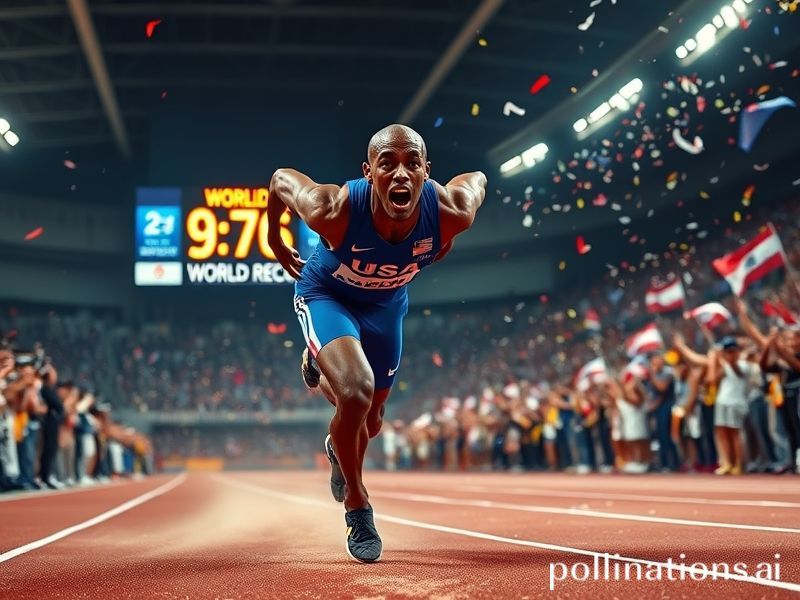Global Sprint to Nowhere: Inside the 2025 Athletics World Championships’ Hype, Heat, and Human Absurdity
Athletics World Championships 2025: A Global Carnival of Sweat, Sponsors, and Existential Dread
By Our Correspondent, Still Jet-Lagged in Tokyo
Tokyo, September 2025 – The planet’s fastest, strongest, and most pharmaceutical-curious bipeds have once again converged on an island that still glows politely at night, this time for the 2025 World Athletics Championships. Delegations from 214 nations—give or take whichever failed state couldn’t bribe the right officials—arrived armed with carbon-fiber shoes, biometric underwear, and the faint hope that a medal might distract their compatriots from the price of eggs back home.
The stakes are, of course, cosmic. A gold in the 100 meters now carries the geopolitical weight once reserved for medium-range missiles. The United States, Russia (competing as the “Neutral Athletes Who Definitely Aren’t Russian”), and China have all parked aircraft carriers—sorry, “floating training camps”—in Tokyo Bay. Satellite imagery suggests they’re mainly there to broadcast inspirational TikToks to the folks who paid for them.
Meanwhile, Africa’s distance-running hegemony remains intact, though Kenya and Ethiopia now outsource pacing to GPS drones so their athletes can focus on the more pressing question: whether to accept citizenship offers from oil-rich Gulf states with marathon-shaped fountains in the desert. The Caribbean continues to sprint as if chased by the combined debt ratings of their tourist-dependent economies. Europe, ever the responsible adult, has built an entire sustainability pavilion next to the stadium, powered by the kinetic energy of discarded gel packets.
The weather is cooperating in that uniquely Tokyo fashion—35 °C, 97 % humidity, and a typhoon politely circling like a bouncer waiting for closing time. Organizers have installed misting stations that feel like being sneezed on by a whale and handed out “cooling scarves” that retail for ¥9,800 (batteries not included). Athletes respond by collapsing in slow motion, a choreography so exquisite it could headline the next Olympic opening ceremony—if anyone still has the budget after paying the carbon offset for flying 2,000 pole-vaulters halfway around the world.
Technology marches on—or rather, sprints. Shoe companies have unveiled prototypes so spring-loaded they technically qualify as low-orbit launch devices. The IAAF, ever vigilant, has deployed portable MRI scanners at the start line to ensure no athlete harbors an extra Achilles tendon grown in a lab. Naturally, the scanners are sponsored by a cryptocurrency exchange whose logo flashes every time someone breaks a world record. The irony is noted, then monetized.
Doping control has evolved into a kind of performance art. Athletes now provide blood, urine, hair, and—rumor has it—a short interpretive dance describing their childhood dreams. The samples are whisked to a pop-up lab in Shibuya run by grad students who haven’t slept since the last World Cup. Results will be released sometime between tomorrow and the heat death of the universe, whichever comes first.
The broader significance? Look no further than the medal table, where national pride is measured to the third decimal place. Every podium finish triggers a stock-market twitch in the winner’s home country—except in the host nation, where the Nikkei has already priced in disappointment. Japan’s sole victory so far came in the inaugural eSports marathon, a 42.195-kilometer slog through a VR rendition of late-capitalist ennui. Viewers described it as “hauntingly realistic.”
Back in the real stadium, the men’s 100-meter final approaches like an international incident. The favorite, an 18-year-old American whose Instagram following exceeds the population of Portugal, warms up under a halo of drones beaming live biometric data to betting syndicates on five continents. His shoelaces are rumored to be woven from recycled fighter-jet fuselage, because nothing says progress like repurposing the machinery of war for a ten-second dash.
Gun goes. Nine-point-four-nine seconds later, the world has a new fastest human and another round of conspiracy theories. The athlete thanks God, his agent, and the energy-drink conglomerate that paid his college tuition. Somewhere, a small island nation files a protest, claiming the winner’s shoes violated the laws of physics—and, by extension, the Geneva Conventions.
When the closing ceremony finally erupts in a synchronized drone display spelling “FASTER, HIGHER, INSURED,” the crowd files out past souvenir stands selling miniature gold medals made—poetically—of chocolate. Everyone agrees the championships were a triumph of human spirit, corporate branding, and the unshakeable belief that running very fast in a circle can, for a fleeting moment, outrun the circles we keep running everywhere else.
Until next time, keep your shoelaces compliant and your passports current. The circus moves on, and the elephants have lawyers now.







